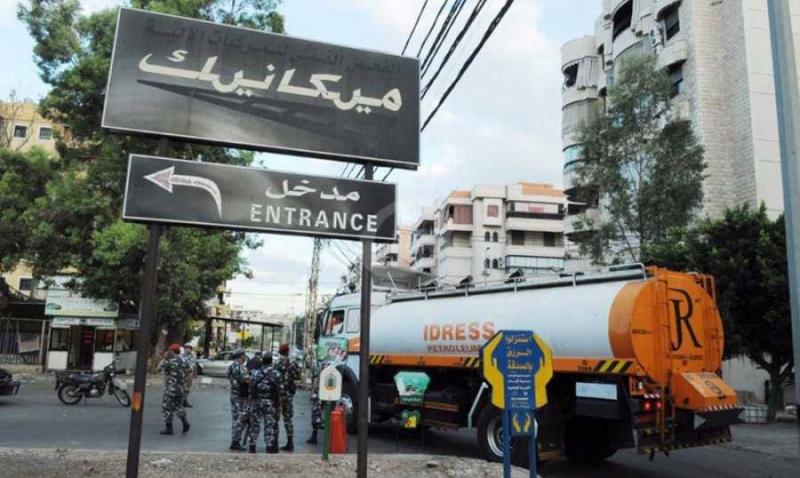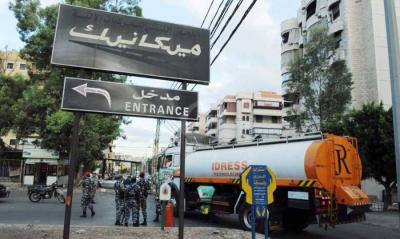The complications of life for Lebanese citizens are increasing, with the collapse affecting everything. However, the situation has reached a critical point concerning "traffic safety," as the roads have become a source of danger for drivers and their passengers. This is due to two main reasons: the first is closely related to the erosion of the state's ability concerning maintenance work, traffic signs, and lighting. The second is the current halt of the "mechanical inspection" system, as the operating company is "working against the law" while waiting for a new set of requirements that will restore the "safety principle" at the beginning of next year.
Years ago, discussions about a new traffic law and necessary reforms for traffic safety were prominent in Lebanese conversations. However, this seems to be a matter of the past as priorities have shifted. It may seem momentarily that discussing traffic safety is a luxury or a diversion from the daily burdens "in times of bread," but the magnitude of dangers on the roads brings to the forefront the quest for safety standards, especially with the suspension of mechanical inspections and the inherent inability to conduct them, coupled with the absence of concerned authorities on both main and secondary roads, and the lack of illuminated traffic signs.
The urgency grows with the increase in the wear and tear phenomena that characterized the "strong era" period. Should we learn a new language to understand traffic signals in this phase? Lebanese people know that the number of active vehicles has significantly decreased due to the spread of the coronavirus. According to statistics from the Internal Security Forces obtained by "Asas," the number of traffic accidents decreased by 16% in 2021 compared to 2020, from 3,155 accidents to 2,648, and the number of fatalities from accidents decreased by 9%, from 412 deaths in 2020 to 375 deaths in 2021.
When comparing traffic accidents for five months between 2021 and 2022, from January 1 to May 31 (see attached image), figures show a 37% decrease in the number of accidents, a 25.9% decrease in fatalities, and a 37.4% decrease in the number of injuries this year compared to the same period last year. However, experts do not consider this decrease as a positive sign, as it is not a result of the application of traffic safety laws, but rather due to the rise in fuel prices and soaring unemployment rates in the country, which in turn has reduced the number of commuters on the roads. If these figures were compared to the number of moving vehicles, the outcome would have been different.
There are no solutions without funding. An official security source confirmed to "Asas" that all these problems negatively and significantly impact traffic safety. "The collapse of the economic situation and major crises have dangerously affected the situation, and the risk increases with road problems, starting from their safety, maintenance, and lighting, along with rising costs for citizens' vehicle maintenance, the breakdown of traffic signals at intersections, and the absence of electricity for nighttime lighting."
Regarding violations, the source points out that "the radars have not stopped working, but the process of issuing violations is approached differently, trying to balance humanitarian conditions with law enforcement, especially since there are issues beyond people's control. How can we issue a violation ticket to someone delayed in paying traffic fees when the relevant offices are closed?"
He notes that security forces are present on the streets but not at every traffic signal, due to a lack of adequate numbers, stressing that solutions exist but all require funding.
Mechanical inspections have been suspended without alternative solutions since May 20, following a decision by Interior Minister Bassam Mawlawi, due to the company continuing to operate against the law despite its contract expiring in 2015. This of course affects vehicle safety, which was highlighted by the president of the Lebanese Academy for Traffic Safety, Kamel Ibrahim, in an interview with "Asas," noting that "the negative impacts of halting inspections will become evident with the start of the winter season. Stopping the inspection process is one of the most dangerous things that has happened; previously, citizens would undergo inspections out of a sense of personal responsibility, especially since the costs were not high. Now they won't do that and will be unable to assess the condition of their tires or brakes due to the high costs amid tough living conditions."
The inspection allows citizens to know the condition of their vehicles and the severity of any malfunctions. Therefore, there must be a solution for violations until a new company is contracted. "How can we imagine trucks and buses without inspections on bad roads and without lighting? This significantly adds to the dangerous elements threatening traffic safety in Lebanon, which is why the decision to eliminate inspections should be reversed as soon as possible."
No inspections before next year. Ayatollah Abdul Ghafour, the head of the vehicle registration department, agrees with Ibrahim on the danger of halting inspections. "The principle of mechanical inspection is a fundamental part of public safety globally since a vehicle's safety is an essential part of public safety, and its negative impact must be taken into account. We have heard of recent accidents caused by brake failures in some vehicles, especially heavier vehicles and small cars."
He stresses the necessity of personal responsibility in this matter to ensure vehicle safety and not to neglect any sign of malfunction that could threaten the driver and others on the road. At the same time, he confirms that there will be no reversal of the decision, which was regarded as a correction of the irregular situation of a company that operated illegally since 2015 and needed to be addressed. He reveals to "Asas" that the administration is in the process of organizing the resumption of mechanical inspections within legal frameworks. "We are currently in the final stages of preparing the requirements document, which has been presented to the tender administration, which has made some comments on it. The administration has taken these notes into account, and an announcement will soon be made regarding the requirements document and the calls for offers. However, the general public sector strike has delayed the implementation of procedures. Most likely, it won’t see the light before the beginning of next year," Abdul Ghafour estimates, adding, "The goal is to return to inspections before the start of 2023, provided that no issues arise beyond the administration's framework."
Regarding the prices of the new inspections, which were the cause of the fundamental issue leading to the halt of operations with the company due to raising fees from 33,000 to 120,000 without legal justification or ministry approval, Abdul Ghafour reassures Lebanese citizens that "the prices will be reasonable," despite the discouraging investment conditions. "Any company today cannot charge the old fee of $22 at the parallel market exchange rate because citizens cannot afford to pay about 660,000 as inspection fees. The company also will not accept the same fee at the 1500 rate. Therefore, the prices could be calculated based on a percentage of raised salaries for workers, which is five times, as the human element is crucial for inspections. Thus, if we talk about an approximate price, it could be five times the previous price, around 150,000 Lebanese pounds at most. However, competition will be the primary factor in determining the price," he noted, adding that a clause has been included in the requirements document for employing most of the old workers in the new company, safeguarding their rights as employees who served the administration for 15 years.
Personal responsibility first. The problems that increase the risks to the deteriorating traffic safety in Lebanon are indicated by Kamel Ibrahim, president of the Lebanese Academy for Traffic Safety, pointing out that "the same negative risks apply to the condition of traffic signs, which have not been maintained since 2019 due to a disagreement with the responsible company over collecting maintenance fees in foreign currency instead of Lebanese pounds. Today, the condition of these signs is worsening, particularly with the absence of any electricity supply, leading to their unclear, irregular, or illogical appearance. Even the control room no longer exists due to damage from the port explosion." The most dangerous aspect, according to Ibrahim, is that "there is no priority for treatment, as the focus is on economic and living issues, which means that the responsibility remains on individuals’ awareness."




